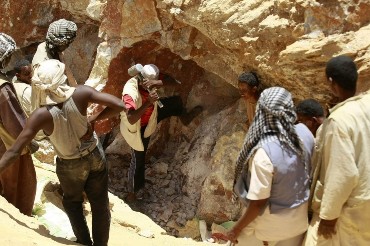Sudan warns against illegal mining activities in neighbouring countries
May 6, 2015 (KHARTOUM) – Sudan has warned its nationals against illegal expansion of traditional mining activities outside Sudanese territories and described the phenomenon as a “time bomb” that would negatively impact on relations with neighbouring countries.

Mohamed told reporters on Wednesday that countries in which Sudanese miners are working are suffering from conflicts and security problems, pointing to the crisis in Libya and the violent attacks of the Islamic group Boko Haram in Niger besides tensions in western Chad.
He added that Chad did not accuse Sudanese miners of involving in any political activities or joining any of the warring factions but noted that several miners were being used as forced labour by outlaws.
The Sudanese diplomat urged the concerned bodies to swiftly control this phenomenon, pointing to organised gangs which provide logistical support to traditional miners to carry out their activities.
“It is not reasonable that those Sudanese [miners] could travel 5000 km without getting support from some parties inside Sudan and also in the countries of transit,” he added.
In May 2011, the Egyptian authorities arrested 73 Sudanese traditional miners who unknowingly crossed the borders in search for gold.
Sudan’ ambassador to Egypt at the time, Abdel-Rahman Sir al-Khatim, said the miners violated Egypt’s immigration law and entered Egyptian territory without visa, pointing they could face up to one year imprisonment and their property would be confiscated.
Gold has become one of Sudan’s largest exports which partially compensated for the loss in oil revenues, which accounted for more than 50% of income until 2011 when South Sudan seceded, thus taking with it most of the country’s oil reserves.
Sudan approved a law to regulate traditional mining by granting licenses and specifying areas to work in to protect them from hazardous conditions and smuggling.
It is believed that traditional mining employs more than a million Sudanese but it is still difficult to obtain credible data.
(ST)
